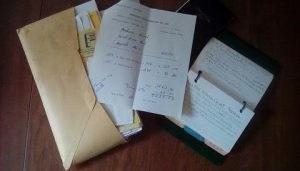 Recently, after completing – without hospitalization or arrest (for significant abuse of a power tool) a major painting project involving thirty-five exterior louvered house shutters attached to My Old House – many people asked me how old the vinyl shutters actually are, when they had first been put up (“gee, when were they last painted?”), and how did I know? Continue reading Diary of an old house
Recently, after completing – without hospitalization or arrest (for significant abuse of a power tool) a major painting project involving thirty-five exterior louvered house shutters attached to My Old House – many people asked me how old the vinyl shutters actually are, when they had first been put up (“gee, when were they last painted?”), and how did I know? Continue reading Diary of an old house
Tag Archives: Family papers
What do I know?
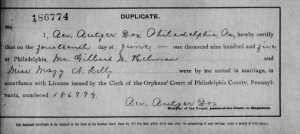
One of Scott Steward’s recent posts reminded me of several conversations I have had with colleagues (not all of them genealogists) on how much we can fill in on our ahnentafeln [German for ancestor tables].
Several staff members at NEHGS have formed a running group called the Runnintafels (my wife came up with the name, and she is not a genealogist). Continue reading What do I know?
‘My four children’
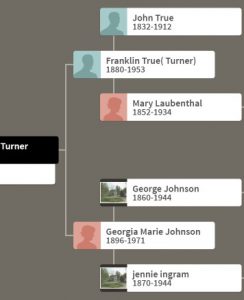 I have an entertaining update on my mysterious great-great-great-grandfather John A. Through alias True (1835–1912). In my recent post on this family, I discovered (with the help of DNA) his second later family, his slightly changed name, four additional children (a son John by each wife) – and wondered whether each of the four children he had by his two wives ever knew each other.
I have an entertaining update on my mysterious great-great-great-grandfather John A. Through alias True (1835–1912). In my recent post on this family, I discovered (with the help of DNA) his second later family, his slightly changed name, four additional children (a son John by each wife) – and wondered whether each of the four children he had by his two wives ever knew each other.
John A. True died at Fostoria, Ohio 14 January 1912 and in the index of Seneca County, Ohio Probate Records on Ancestry.com, I found that he did indeed leave a will. The year 1912 was just recent enough that I still had to write to the courthouse for copies, and I recently received John’s probate in the mail. Continue reading ‘My four children’
Boucher gleanings

Following up on my recent blog post about genealogical memory (“What do you know?”), I took a fresh look at some persistent brick walls in my mother’s family. The blog post – and a 5-generation fan chart template I got from two colleagues – led me to reflect on whether anything more could be gleaned about the background of my great-great-grandfather, William Boucher Jr. (1822–1899) of Baltimore, Maryland.
The answer, I’m happy to say, is “Yes”! Continue reading Boucher gleanings
What the heck are they doing?

We all have them. Yes, those stacks of old photographs passed down to us. They are images from someone else’s life; what can be daunting is that these are pictures we have to appraise even when we know nothing about what they mean. Often disorganized, unidentifiable, and fading, we can’t quite bring ourselves to put them out for the mid-week trash collection. It just isn’t who we are.
In going through my grandmother Alta Sage Lee Dixon’s old photographs, I understand that many of the people in her pictures may always remain unknown to me. Yet I can’t help wondering if there aren’t patterns in her collection. I’m resolved to try and put these “pictures of unknowns” into at least a few “photographic categories.” After all, this is my grandmother’s life – so maybe if I understand how she pictured her own collection, I might understand more about her. Continue reading What the heck are they doing?
Fraternally yours
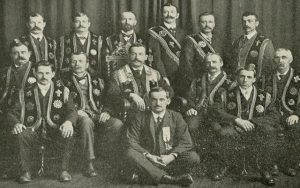 Fraternal organizations are not as commonplace for most people today as they were back in the mid-1800s on through the twentieth century. Our ancestors joined these groups for camaraderie, financial support regarding burials, insurance, and more. There were hundreds of such organizations, some of which popped up for just a brief few years. Continue reading Fraternally yours
Fraternal organizations are not as commonplace for most people today as they were back in the mid-1800s on through the twentieth century. Our ancestors joined these groups for camaraderie, financial support regarding burials, insurance, and more. There were hundreds of such organizations, some of which popped up for just a brief few years. Continue reading Fraternally yours
Flower power
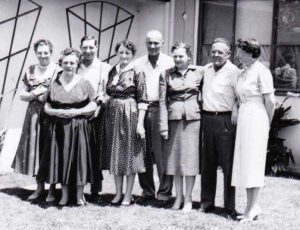
Sometimes in the course of studying family history it helps when the right sort of inspiration knocks at our door. Blog sites like Vita Brevis and different forms of social media allow ways for like minded people of similar genealogical concerns to reach out to one another. And while I would not exactly consider Findagrave.com a “social networking site,” a recent experience reminds me that the inspiration to study family history can come from many different sources.
Seven years ago, I placed virtual flowers on-line for the memorial to my great-uncle Ernest Bedford Payne (1902–1970).[1] I find placing virtual flowers on findagrave memorials does two things: (a) it allows me to pay respect to my loved ones, and (b) allows me a trail of bread crumbs letting me know if I have previously visited a memorial I might not readily remember the next time around. I must confess I hadn’t been back to visit Uncle Ernest’s memorial in quite a while. Continue reading Flower power
Never mentioned
“Some secrets never leave us alone…” – Diane Capri
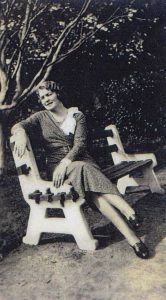
In my father’s house, there was a subject we were forbidden to speak of. This was the subject of my grandmother’s adoption and her biological mother.[i] Under pain of reprisal, we were told never to speak of it – or of her. We didn’t even know her name, and what leaked through the hushed whispers of grown-up conversation was not murmured with much kindness.
The secret of grandmother’s adoption was the order of the day as long as my adopted great-grandmother was living. My great-grandmother was greatly revered, so for us to cause her any duress would rank as an unforgivable transgression. These “never to mention” rules stayed in effect long after my great-grandmother’s death in 1970 – though this maxim certainly didn’t stop the budding genealogist in me from finding new angles to find out the truth behind the whispers. Continue reading Never mentioned
Become an expert
 I did not learn to spell properly until I learned to type at the Katharine Gibbs School. This may have had something to do with my less-than-perfect handwriting. Seeing a word in type instead of scribble helps me spot the errors.
I did not learn to spell properly until I learned to type at the Katharine Gibbs School. This may have had something to do with my less-than-perfect handwriting. Seeing a word in type instead of scribble helps me spot the errors.
In genealogy, of course, we run into all kinds of spellings, and it is hard to decide whether we should use the literal spelling from the record or modernize and standardize the word or name. I have had to standardize words for clients who simply could not deal with “misspellings.” Also, in the case of documents where superscripts and abbreviations are used, like “ye” for “the” or strange letters, such as “ff” for capital F, converting to typed text is all the more complicated. Continue reading Become an expert
The long way home
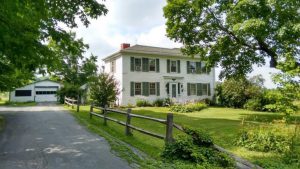 A few years ago, when I first began to make quiet rumblings about selling My Old House and moving closer to my son, most people reacted with horror, surprise, and objections: “You wouldn’t really!” “Would you really sell it?” “What would your father, mother, grandparents say?” “Good Grief, sell your Old House?!”
A few years ago, when I first began to make quiet rumblings about selling My Old House and moving closer to my son, most people reacted with horror, surprise, and objections: “You wouldn’t really!” “Would you really sell it?” “What would your father, mother, grandparents say?” “Good Grief, sell your Old House?!”
I would. I will! (Cash and certified checks accepted!) Continue reading The long way home